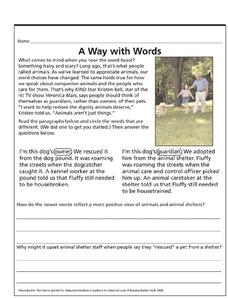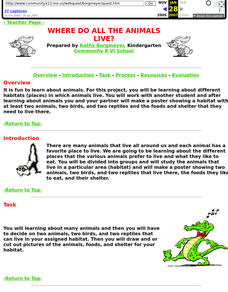Curated OER
Which Animal Lives Where?
Use this lesson plan in your classroom for a quick and easy way to review animal habitats. Young children use magazine clippings, pictures provided, or other resources to create a collage depicting an animal habitat. This is a great way...
Curated OER
The Great Kapok Tree by Lynne Cherry
With The Great Kapok Tree, by Lynne Cherry as the hook learners discuss the rainforest, the animals that live there, and conservation efforts. Then, students write a letter to the man in the story asking him not to cut down the Kapok...
Curated OER
Salmon in the Classroom
Students list the salmon life cycle stages in order. They draw a stream with the vegetation, animals, and water quality parameters that are necessary for salmon survival. Students explain the connection between animal morphology and...
Cornell Lab of Ornithology
Jump, Glide, or Fly? Exploring Bird Evolution
How have birds evolved from prehistoric animals? With the three-part lesson, small groups first research different prehistoric animals and determine whether they are birds. Then, scholars explore different bird adaptations using the Flap...
Science Matters
That’s An Otter Story
Young scientists discover how sea otters' habitats have changed due to human impact. Through conversation, video observation, and story reading, scholars identify how human interactions change a specific ecosystem in both positive and...
Curated OER
Animals and Habitats
In this animal habitats worksheet, students match the 4 pictured animals to the pictures that feature their respective habitats.
Curated OER
Grzimek's Animal Life: Polar Bears
Young scholars examine the physical adaptations of polar bears. In this animal adaptations lesson plan, students access interactive resource pages on the Internet, discovering the habitats of polar bears and their physical attributes....
Curated OER
Garden of Eden
Students view a video clip about animals and their habitats. They work together to discuss how different animals adapt to their environments. They create a new habitat for a specific animal and draw new adaptations for them.
Curated OER
Who's Who?
Students explore biology by identifying animals and their environments. In this animal characteristic lesson, students read assigned text about farm animals, how they are raised, and what they are used for in our society. Students view a...
Curated OER
Animal Habitat Dioramas
What a better way to have learners show what they know than with a diorama? Kids research an animal, its habitat, ecosystem, and environment in order to create a three-dimensional diorama. Have older children write a short paper on their...
Curated OER
A Way with Words
In this reading comprehension worksheet, students read and discuss a short paragraph on choosing the right words to describe animals and then answer two short answer questions.
Curated OER
Animal Keynote Report
Learners produce a research project on an animal. Using the Internet, they find pictures and information about animals. They are also given a list of items that should be covered in their report, including the appearance of the animals,...
Curated OER
Where Do All the Animals Live?
Students study animal habitats and make a poster showing two animals, two birds, and two reptiles in their habitats.
Curated OER
Hermit Crabs in the Classroom
Learners interact with hermit crabs in the their classroom. In this hermit crab lesson, students handle and observe hermit crabs while learning about their habitats and how to treat animals. They watch how the animals move and answer...
Curated OER
Water, Water Everywhere (Pond Animals)
Second graders examine the characteristics of animals who live in a pond environment. In groups, they describe the various stages in the life of a frog and identify the characteristics of other pond animals. Using this information,...
Curated OER
Sharing Our Knowledge
Students evaluate their participation in an animal welfare service project. In this animal welfare lesson, students reflect upon their experience by using their feelings and descriptions in their writing. Students share their experiences.
Curated OER
Investigating Local Ecosystems
Students observe a local area for living organisms and their habitats. In this local ecosystems lesson, students complete an online field journal. Students share their findings and sort them into categories. Students visit a...
Curated OER
A Walk in the Wild
Fifth graders identify characteristics of animals and their habitat. In this animal science lesson, 5th graders read Crinkleroot's Book of Animal Tracking and and Animal Tracks. Students match animal tracks to the correct animal...
Curated OER
Habitat Basics
First graders get out and explore two different habitats to examine how each one meets the needs of the plants and animals that dwell there. They discuss what they've learned about animal habitats as they explore the outdoor environment....
Curated OER
Specialized for the Sea
Students use pictures and make a mural to investigate how ocean animals are adapted to certain parts of their environment.
Curated OER
Invent an Animal
Young scholars recognize how animal adaptations help animals survive in their environment. In this characteristics lesson, students create an original animal that can adapt to a specific habitat. Young scholars create a model of...
Curated OER
Habitats
First graders investigate animal habitats. In this habitats instructional activity, 1st graders visit the woods to identify examples of food, water, and shelter that animals use to survive. Students complete a worksheet.
Curated OER
Animal Homes
Students explore how an animal's relationship to its habitat affect the animal's survival. They discuss animal habitats and the animal's relationship to that habitat through the food chain, life cycle, community, and balance of nature....
Curated OER
Costs of Providing for animals
Students explore the necessary costs of animals shelters and taking care of one pet. In this providing for animals lesson, students calculate the costs of keeping a pet. Students understand the need for outside funding for animal shelters.























